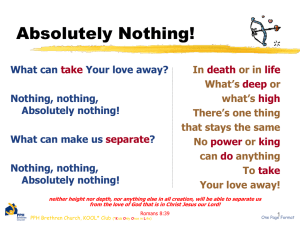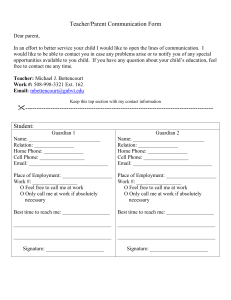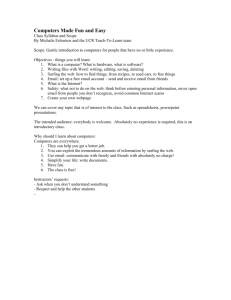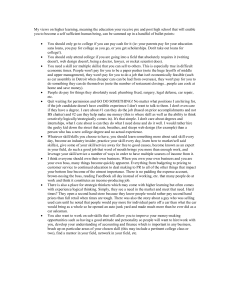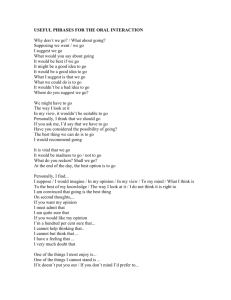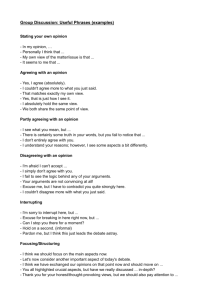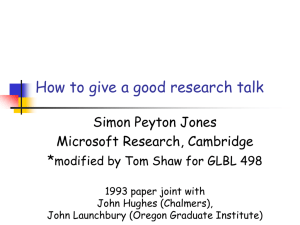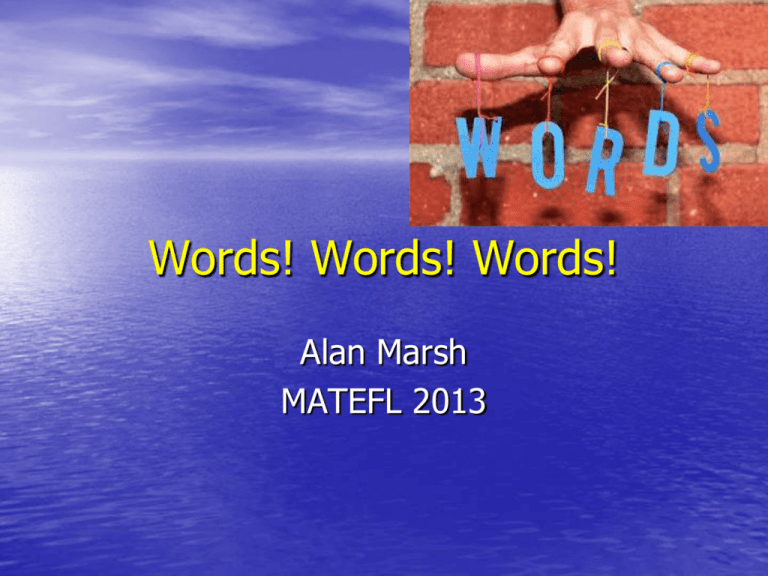
Words! Words! Words!
Alan Marsh
MATEFL 2013
Today’s agenda
1
2
3
4
5
6
Numbers and words
Three problems
Absolutely perfect!
Pre-teach? Pre-storm!
Sorting and storing
Er …….? Or Is this the most useful lesson I’ve
ever taught?
7 Getting Engaged …. Marrying words!
English words and numbers
• 50,000
• 20,000
• Half a million
• 2,000
• 7,500
How many words …?
• 1 How many words are there in English?
• 2 How many words does an educated native speaker of
•
•
•
•
English understand?
3 How many words does an educated native speaker of
English have as part of their active vocabulary
4 How many words does a speaker of English need to be
able to take part in everyday conversation?
5 How many words are defined in an Advanced Learner’s
Dictionary?
6 How many words does a reader of English need to
understand most texts?
• 1 How many words are there in English?
• Half a million?
• 2 How many words does an educated native speaker of English
understand?
• 50,000?
• 3 How many words does an educated native speaker of English
have as part of their active vocabulary
• 20,000?
• 4 How many words does a speaker of English need to be able to
•
•
•
•
take part in everyday conversation?
About 2000
5 How many words are defined in an Advanced Learner’s
Dictionary?
Macmillan’ Advanced Learner’s Dictionary: 7500 key words
6 How many words does a reader of English need to understand
most texts?
How many words does a reader of English
need to understand most texts?
• Top 2,000 words = 83% of most texts i.e. 1 out
•
•
•
of 5 will be unfamiliar
Top 6,000 words = 90%, which means 1 word
out of 10 will be unfamiliar to you
Top 10,000 words = 95% i.e. only 1 word out of
20 will be unfamiliar to you - pretty good if you
need to work words out from context.
Macmillan Advanced Learner’s dictionary
identifies 7500 key words that advanced
learners should know
The top 2000 work the hardest!
• Enable learners to speak, read, write and listen
•
•
at Elementary (A1) level about everyday
subjects (+ some subject specific vocabulary)
Since they’re so frequent, they can help learners
to work out meanings, and to ask for help in real
situations
Learners’ dictionaries typically use 2000-2500
words as their ‘defining vocabulary’
Mmmm ….. Is there a problem?
• How many new words do you teach every
•
•
•
•
lesson?
How many times do learners need to recall and
revise words before they’re permanently stored?
How many lessons of English do learners have?
How long do they need in order to permanently
store (and be able to recall) 10,000 words?
Is there a problem here?
What does ‘knowing a word’ mean?
pronunciation
word building
stresses
synonyms
translation
part of speech
suburbs
core meaning
connotation
antonyms
register
colligates
collocates
How can we help?
•
•
•
•
•
Help them to ….Notice
Help them to …Record and Store
Help them to …Retrieve and Use
Help them to …Extend and Enrich
Introduce them to learn…Words
for getting around words
Write down the first word(s) that
come to mind
•
•
•
•
•
•
•
•
•
•
Hot
Dog
Baby
Hair
Glass
Bath
Glue
Carpet
Train
Light
WORD LIST
enlarge
crawl
female
love
abandon
car
warm
van
nappy
affection
baby
vehicle
hot
trainees
expand
cool
cot
little
increase
cold
remember
relinquish
male
forget
lorry
trainer
diminutive
A Xanudasian student’s exercise book
• WORD
TRANSLATION
•
•
•
•
•
•
•
•
•
•
•
•
•
•
•
express
opt out
star
interview
shun
kinsman
foyer
piss
pottery
o’er
hotchpotch
semi-conductor
prosecuted
atcito
organo kotor nganinot
Mgumba stron (ff skulo, Firmo)
galactio
tuo baire medjurma
bacawao ina terusco
megrobaro
auditorio pri mecxt
kchir
oborosto
tubea
senico kotor emio ina
Tulmulenco
semikonductto
epallis na magistrato
• Jim Scrivener: Learning Teaching Macmillan (2011)
•
Superordinates and hyponyms
•vehicle
car
van
lorry
Lexical set
crawl
baby
nappy
cot
synonomy
• enlarge/increase/expand
• love/affection
• abandon/relinquish
• little/diminutive
Does synonomy really exist?
•
•
•
•
•
•
•
Collocations
expand the economy or enlarge the economy
a diminutive old woman – what’s wrong?
a little old lady
Connotations:
The soldier abandoned his post
The soldier relinquished his post
Antonomy or words along a cline
• hot/warm/cool/cold
• male/female
• remember/forget
• trainer/trainees
Weather temperatures
• cool
• hot
• chilly
• boiling
• freezing
• cold
• warm
• boiling
• hot
• warm
• cool
• chilly
• cold
• freezing
Words along a cline
• laugh
• smile
• giggle
• chortle
• guffaw
• grin
Words along a cline
smile
guffaw
grin
chortle
giggle
laugh
Words on a cline
• irate
• irritated
• furious
• annoyed
• hopping mad
• angry
• livid
Acknowledgement: Tim Bowen
Absolute (extreme) adjectives for ….
•
•
•
•
•
•
•
•
•
sad
good
drunk
cheap
easy
hungry
valuable
surprised
angry
•
•
•
•
•
•
•
•
•
•
•
•
•
Sad?
Heartbroken!
Good?
Perfect
Drunk?
Legless!
Cheap?
A give-away!
Easy?
A piece of cake!
Hungry?
Starving!
Valuable?
Absolutely …..
•
•
•
•
•
•
•
•
•
•
•
•
•
•
•
Hungry? I’m absolutely __________________________!
I was more than angry when I found out. I was absolutely __________!
This painting isn’t just valuable – it’s absolutely _________________!
Was the exam easy? It was an absolute __________________!
The meal was really tasty – absolutely _________________!
This exercise is very difficult. In fact. It’s absolutely ______________!
I wasn’t just sad when I heard the news; I was absolutely __________!
This item is extremely important. In fact, it’s absolutely _______________ for
your survival.
The dog isn’t just ugly; it’s absolutely __________________!
He drank 4 litres of wine last night and was absolutely ___________!
This device doesn’t work – it’s absolutely __________________!
These shirts are really cheap – they’re an absolute _______________!
The weather isn’t just cold today – it’s absolutely ________________!
There is only one painting like this in the whole world. It’s absolutely __________!
I was absolutely ________________ when I heard the news! I never expected
him to pass the exam. And he got an A grade too!
Absolutely …..
•
•
•
•
•
•
•
•
•
•
•
•
•
•
•
Hungry? I’m absolutely ravenous!
I was more than angry when I found out. I was absolutely furious!
This painting isn’t just valuable – it’s absolutely priceless!
Was the exam easy? It was an absolute doddle!
The meal was really tasty – absolutely delicious!
This exercise is very difficult. In fact. It’s absolutely impossible!
I wasn’t just sad when I heard the news; I was absolutely heartbroken!
This item is extremely important. In fact, it’s absolutely essential for your survival.
The dog isn’t just ugly; it’s absolutely hideous!
He drank 4 litres of wine last night and was absolutely legless!
This device doesn’t work – it’s absolutely useless!
These shirts are really cheap – they’re an absolute give-away!
The weather isn’t just cold today – it’s absolutely freezing!
There is only one painting like this in the whole world. It’s absolutely unique!
I was absolutely flabbergasted when I heard the news! I never expected him to
pass the exam. And he got an A grade too!
Personalisation
• Have you ever been absolutely
•
•
•
•
legless/furious/flabbergasted?
What was your last absolutely delicious meal?
Have you ever bought anything that was
absolutely useless?
Or that was an absolute give-away?
Is there an absolutely hideous building in your
town or city or country?
Dictogloss
Although it was her first visit to America,
something about the atmosphere in the
old house – the carpet, the antique
furniture in the lounge, the colour of the
wallpaper in the hall, the dank
atmosphere, the strange musty smell on
the steps – convinced her that somewhere
in the deep, distant past she had been
there before.
Dictogloss intermediate 1
• The rain was beating relentlessly against
the window pane and the wind was
howling menacingly around the lonely
wooden cabin on the snow-covered
mountainside. Tom was scared. Then he
heard a strange, muffled noise outside.
Someone was trying to open the door!
•
•
•
•
•
•
•
•
the
the
the
the
the
the
the
the
dormitories
corridors
porridge
water in the communal bath
towels
basins
socks
lavatories
Whoever writes of his schooldays must beware of exaggeration and
self-pity. I do not claim that St. Cyprian’s was a sort of Dotheboys
Hall. But I should be falsifying my own memories if I did not record
that they are largely memories of disgust.
The overcrowded, underfed, underwashed life we led was
disgusting, as I recall it. If I shut my eyes today and say “school”, it
is, of course, the physical surroundings that first come back to me:
the flat playing field with its cricket pavilion and the little shed by
the rifle range, the draughty dormitories, the dusty, splintery
passages, the square of asphalt in front of the gymnasium, the rawlooking pinewood chapel at the back.
And at almost every point some filthy detail intrudes itself. For example, there were
the pewter bowls out of which we had our porridge. They had overhanging rims,
and under the rims were accumulations of sour porridge, which could be flaked off
in long strips. The porridge itself, too, contained more lumps, hairs and
unexplained black things than one would have thought possible, unless someone
were putting them there on purpose. It was never safe to start on that porridge
without investigating it first.
And then there was the slimy water of the plunge bath – it was twelve or
fifteen feet long. The whole school was supposed to go into it every morning and I
doubt whether the water was changed at all frequently – and the always damp
towels with their cheesy smell. And the sweaty smell of the changing-room with its
greasy basins and, giving on this, the row of filthy dilapidated lavatories, which had
no fastenings of any kind on the doors, so whenever you were sitting there
someone was sure to come crashing in.
It is not easy for me to think of my schooldays without seeming to breathe in a
whiff of something cold and evil-smelling – a sort of compound of sweaty socks,
dirty towels, faecal smells blowing along corridors, forks with old food between the
prongs, neck of mutton stew, and the banging doors of the lavatories and the
echoing chamber pots in the dormitories.
George Orwell, Such, Such Were the Joys
Learner Training
1 Circumlocution and paraphrasing
strategies
2 Storing lexis: keeping records
3 Really knowing a word
CROSSWORD RACE
The answers!
•
•
•
•
•
•
•
3A stale
9D improbable
16D toothpaste
7D delete
15A look it up
12D unemployed
1D vehicle
13D delicatessen
10A fall asleep
8A engine
11A rise
14A exhausted
2D catch up
17A coach
10D fuel
6D broken up
4D lose
5D tears
20A error
19A shark
18A vet
•
•
•
•
•
a.
b.
c.
d.
• e.
•
• f.
•
•
• g.
•
•
It’s the _____ _____ … fresh/wake up/win/probable
It’s ______ _____ _____… go up/mistake
It _______ _____ _____ as cancel
It’s a _____ _____ means of transport/fish
It’s _____ _____ _____ _____ .. coal, oil, gas etc. /
car, bus, van, etc.
It’s the person _____ …. (vet)
It’s the place _____ … (delicatessen)
It’s _____ _____ _____ you … (engine)
It’s _____ _____ _____ you _____ for _____ …
(toothpaste)
It’s _____ … (tears)
It’s _____ you _____ _____ you … (unemployed)
It’s _____ you _____ _____ you … (look it up /
catch up)
It’s _____ you _____ _____ you … (exhausted)
Paraphrasing and circumlocution
•
•
•
•
It’s
It’s
It’s
It’s
•
•
•
•
•
•
It’s the thing/stuff you use when you/to …
It’s the place where ….
It’s a/the person who …
It’s how you (feel) when ….
It’s what you (do) when you/to ……
An example sentence with a context
a synonym/another word for ….
the opposite of …..
a kind/type/sort of ..
the general word for …, …., and …
Useful phrases in Italian
• Come se dice ..?
• E un’altra parola che vuol dire …..
• E un sinonomo di ...
• Se dice cosi quando si ....
• E il contrario di ….
• E un tipo di ..... E una specie di ...
• E una cosa che se usa quando /per
• admire
exciting
killer
professor
• attendance
experience
• attractive
factor
leader
record
• bad
fair-haired
lovely
rugged
• beautiful
fair-skinned
lover
scenic
• boring
fantastic
magnificent sick
• cute
fascinating
• flight attendant
moving
• gang
newscaster
suntanned
good-looking
• dramatic
handsome
law
protection
dangerous
stunning
sunburnt
elegant
pig
encounter
die
doctor
murder
rescue
Words we like ….
• mellifluous
• serendipity
• flabbergasted
• helter-skelter
• wishy-washy
• And in Maltese ….
• sahansitra
Engagement … and marry the
words
• Choose two you like… and say why
• Connect three in a sentence
• Write a newspaper headline
• Make up a story
• Make up a long sentence
• And now …..
• How many can you remember?
Some websites for starters …
•
•
•
•
•
•
•
•
www.teachingenglish.org British Council
www.onestopenglish.com Macmillan
www.ELTCommunity.com Pearson Longman
www.matefl.org many more links
www.mes-english.com flashcards
www.learningenglish.com for your learners
www.etprofessional.com practical magazine
??????????
Books I’ve found very useful
•
•
•
•
•
•
•
•
•
Vocabulary In Use, CUP: the whole series
(including Collocations In Use, Phrasal Verbs In Use, etc.)
S. Thornbury How To Teach Vocabulary (Longman)
S. Redman and R. Ellis A Way With Words (1-3)
M.McCarthy, A. O’Keefe, S. Walsh Vocabulary Matrix, Heinle
Cengage
J. Scrivener Learning Teaching, Macmillan
S. Thornbury, An A-Z of ELT, Macmillan
J. Richards, J. Platt, H. Platt Dictionary of Language Teaching &
Applied Linguistics, Longman
All the Advanced Learner’s Dictionary, Cambridge, Macmillan,
Oxford, and Collins Cobuild
• A last couple of thoughts …..
Bricks and mortar …..
Inspirational dictation
• conveyed
• very
• grammar
• without
• can
without
vocabulary
nothing
conveyed
little
be
can
be
A famous quote ……
“Without grammar very little can be
conveyed, without vocabulary nothing
can be conveyed”. (Wilkins 1972)
• alanmarshinmalta@gmail.com
• 9942 8447
• And ……….
• Thank you!

